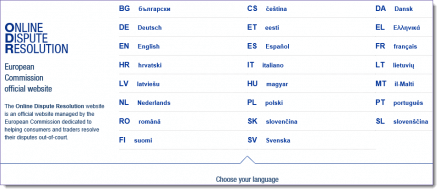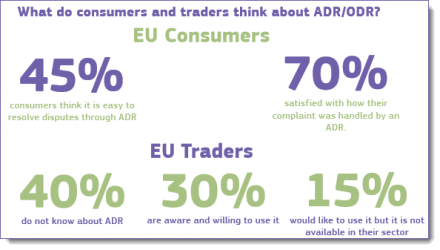What is online dispute resolution?
Online dispute resolution (ODR) is a form of alternate (i.e., non-litigation) dispute resolution (ADR) that uses technology to facilitate the resolution process. As in alternate dispute resolution, ODR involves negotiation, mediation or arbitration, or a combination of the three.
While in ADR there are typically three parties (two disputants and the third neutral party), in ODR the technology itself becomes a fourth party that embodies its own range of capabilities – information organization, sending automatic responses, shaping written communications, monitoring performance, scheduling meetings, clarifying interests and priorities and so on. As technology advances we may even see the emergence of fourth party “avatars” that are created to judge disputes and become more skilled with each case. [1]
How does it work?
ODR has the potential to dramatically reduce the pressure on overburdened court systems by handling, for example, small-claims disputes or personal injury claims. But so far, only a handful of European countries (Switzerland, Austria, Norway) have succeeded in implementing ODR frameworks to scale. [2] For the most part, ODR is being used to handle commercial disputes in general and e-commerce disputes in particular.
A good example is Modria, a leading ODR cloud-based platform that provides retailers with a technology-mediated channel for settling disputes with consumers and thereby significantly reducing legal and customer service expenses. Modria’s customers create policies (or use Modria’s pre-configured policies) to automatically trigger actions in the resolution process including issuing a refund, sending a message, or routing to the right agent. The resolution process is initiated by the consumer directly from the retailer’s website and is guided step-by-step through the dispute resolution process. With one-click the customer can escalate to direct contact with customer service, and Modria also supports mediation and arbitration.
What happens when the dispute is cross-border?
Now that’s the (multi-)million-dollar question. The global e-commerce market is growing rapidly and cross-border e-commerce is becoming a significant percentage of that. Yet ODR platforms like Modria support English only.
Recognizing that for cross-border e-commerce to flourish, there has to be a convenient, multilingual dispute resolution mechanism, European Commission launched its official ODR portal in February. As you can see below, the consumer can initiate the ODR process in any one of the 23 official European languages:
Currently there is a note below the “Choose your language” message that “…you might be redirected to English content if a translation is not available yet.” One can only assume that, as the system scales up, more and more of the website will be available in the consumer’s native language.
 At this juncture, online traders are only obligated to provide a link to the ODR Platform on their website, and the ODR Platform will only automatically transfer the complaint to that entity if both the consumer and trader both agree on an ADR entity to handle their dispute. [3] The jury is still out as to whether this EU ODR initiative will be embraced by online traders and their cross-border customers. As shown in the info-graphic to the right [4], there is still work to be done to spread awareness, especially among traders.
At this juncture, online traders are only obligated to provide a link to the ODR Platform on their website, and the ODR Platform will only automatically transfer the complaint to that entity if both the consumer and trader both agree on an ADR entity to handle their dispute. [3] The jury is still out as to whether this EU ODR initiative will be embraced by online traders and their cross-border customers. As shown in the info-graphic to the right [4], there is still work to be done to spread awareness, especially among traders.
Cracking the language barrier is key to the proliferation of cross-border ODR
ODR industry thought leaders [5], [6] are hard at work designing models for global ODR systems that can reliably handle high volumes of ODR traffic within a labyrinth of diverse legal systems and across multiple languages. One suggestion is that the ODR process will be conducted in the language in which the transaction took place – or as determined by the online arbitrator. It also seems likely that being multilingual will be one of the threshold requirements for the online arbitrators. Perhaps open-source ODR translation databases can close some of the linguistic UI/UX gaps as well. The only thing that can be said with confidence today is that with technology advances and with the growth of cross-border e-commerce, robust multilingual ODR platforms will become a reality — sooner rather than later.
References


